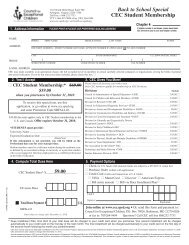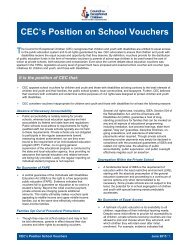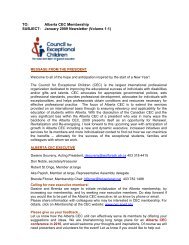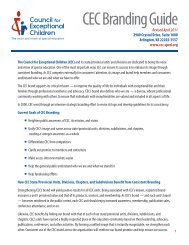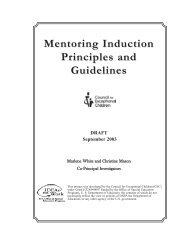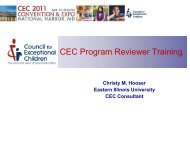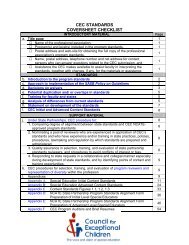What Every Must Know Special Educator - Council for Exceptional ...
What Every Must Know Special Educator - Council for Exceptional ...
What Every Must Know Special Educator - Council for Exceptional ...
Create successful ePaper yourself
Turn your PDF publications into a flip-book with our unique Google optimized e-Paper software.
Figure 2.2 Minimum CEC Expectations <strong>for</strong> Entry-Level <strong>Special</strong> <strong>Educator</strong>s<br />
Standards-Based<br />
Curriculum Content<br />
These knowledge and skills sets are the foundation<br />
upon which CEC builds its work at both the state and<br />
national levels to ensure that preparation programs<br />
incorporate CEC standards into their curricula and<br />
that state and provincial jurisdictions incorporate<br />
the standards into their licensing requirements. It is<br />
through professional standards used by preparation<br />
programs and aligned with licensing systems that<br />
the public can be assured that special educators are<br />
appropriately prepared <strong>for</strong> safe, ethical, and effective<br />
practice (CEC, 2002a).<br />
At the entry level, CEC preparation standards are<br />
developed around 10 initial roles and 6 advanced roles<br />
content domains that describe the knowledge, skills,<br />
Subject-Matter<br />
Content<br />
Individualized<br />
Pedagogical Content<br />
and dispositions shared by all professional special<br />
educators. At the advanced level, CEC preparation<br />
standards are developed around six content standards<br />
that describe the knowledge, skills, and dispositions<br />
shared by all professional special educators practicing<br />
at advanced levels. Although the content standards<br />
cross special education specialty areas, the specific<br />
sets of knowledge and skills in<strong>for</strong>m and differentiate<br />
the content, context, and issues of the respective<br />
specialty areas (e.g., early childhood, mild/moderate,<br />
developmental disabilities, and learning disabilities).<br />
They provide the knowledge and skills that special<br />
educators must master <strong>for</strong> safe, ethical, and effective<br />
practice. The knowledge and skill sets are located in<br />
the Appendix. CEC continuously conducts validation<br />
2 CEC standards are not intended to identify and prescribe at a micro level of detail all evidence-based interventions along with all components<br />
of each <strong>for</strong> which preparation programs should be required to account. CEC professional preparation standards do not identify specific<br />
methods or strategies, (e.g., the xyz learning strategy or the xyz reading method). CEC does not use such a heavy-handed top down approach<br />
in validating its professional preparation standards. This decision was based on the dynamic nature of evidence bases. Additionally, CEC felt<br />
that such an approach was inconsistent with the collegiality across professions.<br />
This does not imply that CEC eschews the value of evidence-based practice. In fact, the fifth edition of <strong>What</strong> <strong>Every</strong> <strong>Special</strong> <strong>Educator</strong> <strong>Must</strong> <strong>Know</strong><br />
states, “A foundation assumption of the CEC standards is that all special education professionals will use evidence-based research in their<br />
decision making.” The CEC standards frequently use the term “effective practice” specifically to connote that preparation programs will<br />
teach the current state of knowledge <strong>for</strong> evidence-based practices. There are also Initial and Advanced Common Core Standards that deal<br />
specifically with this issue. CEC initial common core standards make clear that candidates <strong>for</strong> special education licensure should know how<br />
to access and use evidence-based practices. The language does not attempt to delineate every evidence-based practice and its components.<br />
Rather knowledge and skills, along with the balance of the CEC Content Standards, affirm the significance of evidence-based professional<br />
practice broadly.<br />
Although the CEC Standards are not designed to identify specific evidence-based practices along with their components <strong>for</strong> which preparation<br />
programs might be required to account, the CEC Standards make clear the expectation that special education teacher candidates should<br />
understand appropriate research methods <strong>for</strong> special education practice, know validated evidence-based practices, know how to evaluate and<br />
modify their practice, and engage in evidence-based practices.<br />
SECtion : aSSuring WEll-prEparEd SpECial EduCation proESSionalS



